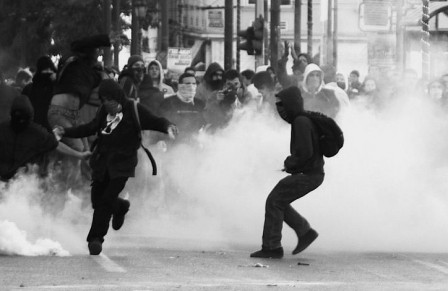Will Greece’s Social Unrest Be Contagious?
At least three people died in Athens today as protesters set fire to a bank with Molotov cocktails during a general strike and massive nationwide demonstrations against planned austerity measures. Some protesters made an attempt to storm Greece’s parliament, but were prevented by riot police firing tear gas. Protesters were taunting MPs to come out and calling them “thieves”. Violence was also reported in another demonstration in the Northern city of Thessalonoki.
The hundreds of thousands protesters across Greece on Wednesday were mobilized by left-wing parties and trade unions who claim that austerity measures agreed by the Greek government with the European Union and the International Monetary Fund (IMF) are unfairly targeting the poor.
The two days general strike started on Tuesday and has paralyzed Greece, including schools, hospital, public transportation and air traffic. On Tuesday, civil servants were protesting over having their pays and pensions cut. Greece’s parliament is scheduled to vote on the EU aid package for Greece before the end of the week. The EU has agreed to provide 80 billions Euros to Greece, providing the country cuts its budget deficit. The bail-out deal is designed to prevent Greece from defaulting on its massive debt obligation.
Today and yesterday’s general strike is the third one since the debt crisis erupted in Greece. The European markets today amid rumors that Greece’s financial crisis will spread to Spain and Portugal, and fears that the Greek package will not be enough.
Prime Minister George Papandreou went into panic mode today, and said that Greece was at the edge of a precipice. “Nobody has the right to violence, and particularly violence that leads to murder. Violence breeds violence,” said PM Papandreou in front of Greece’s parliament.
However, according to protesters, it is the action and the fault of the riot police whose brutality had led to today’s escalation in violence. But what is perfectly clear is that Greek protesters’ anger is directed against the symbols of capitalism, and what they view as incompetent and corrupt politicians. Further, the thematic of Greece’s social unrest is an expression of growing global discontent.
Greece can be credited as the birth place to Western civilization and to have generated the early concept of democracy. What Greeks are doing now by expressing their anger towards a financial system, which brought us the worse financial crisis since 1929, and the political class is not surprising at all. What is surprising is the passivity of the middle-class in other European countries and the United States. The same deep anger brewing in Greece is brewing worldwide against the same institutions, the same people, and the failure of global ultra-capitalism.
But at least Greeks have the courage to take their discontent into the streets, just like the Red Shirts movement in Thailand, as opposed to the general passivity prevalent in other European countries and of course America. 42 years ago, in May 1968, revolution was in the air. It could happen again, and this time around Greece may be leading the way.
Related Articles















One Response to Will Greece’s Social Unrest Be Contagious?
You must be logged in to post a comment Login